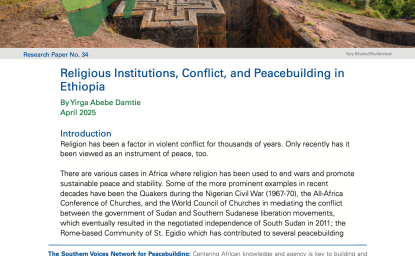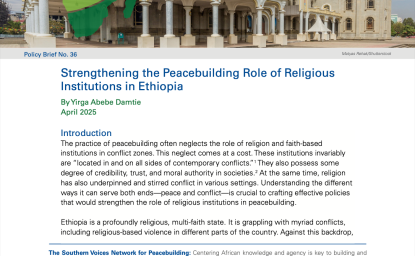W
hile Gaza, Ukraine, and Syria dominate the news, the ongoing conflict in Haiti and the Kenyan-led Multinational Security Support Mission (MSSM) trying to quell it often get overlooked.
The Kenyan police force is in Haiti because the United States cannot ignore a failed state on its doorstep. When US officials approached Kenyan President William Ruto about an intervention to help stabilize Haiti, he readily agreed.
Major opposition from Kenyan civil society, parliamentary objections, and court challenges delayed the deployment by a year, but ultimately President Ruto prevailed, and the first 400 police officers arrived in June 2024. But after some initial successes, re-escalation in gang violence, accelerated wanton killings, and a looming humanitarian crisis are putting the mission’s success in jeopardy.
Beyond the politics and strategy of the police deployment, the MSSM signals the rising power of the African diaspora, foreshadows African women’s growing role in security and peacekeeping operations, and presents an opportunity to revisit the Responsibility to Protect (R2P)—the UN doctrine calling for intervention when a state cannot or is unwilling to protect its citizens—in countries like Sudan.
Despite its future uncertainty, the MSSM has had an outsized impact in heightening African interest in its diaspora. President Ruto called the intervention a “strong commitment to Pan-Africanism” and said it reflected a desire to “restore the dignity” of Haiti, the world’s first independent Black republic.
Africa’s focus on Haiti coincides with a growing interest in the African diaspora in the United States, where the diaspora is viewed as an economic, cultural, and foreign policy asset. President Biden’s Advisory Council on African Diaspora Engagement in the United States further underscores US determination to strengthen the connection with Africa in a multipolar international arena, rife with competition from Russia and China.
When Kenya sent an all-female police unit to Haiti in October, it not only elevated the visibility of women in peacekeeping missions but also highlighted their role in reducing gender-based violence. Complementing the deployment, the influential African Women Leaders Network launched its diaspora chapter at the United Nations’ 2024 Commission on the Status of Women, where African women connected with Haitian counterparts. Both sides pledged to work for peace and committed to initiating joint sustainable development programs.
The MSSM still faces an uphill battle. With spiraling violence, chronic underfunding, and challenges for the mission in the UN Security Council (UNSC) spurred by Russia and China, this is a time for the African Union (AU), with its diaspora connections, to confront China and Russia to end UNSC opposition to a Kenya-led peacekeeping mission and push the UNSC to consider a similar R2P intervention in Sudan. A successful Haitian peacekeeping mission with support from the AU and the UNSC would be a win for Haiti and reinforce and strengthen the role of the global African diaspora in conflict resolution.
Author


Africa Program
The Africa Program works to address the most critical issues facing Africa and US-Africa relations, build mutually beneficial US-Africa relations, and enhance knowledge and understanding about Africa in the United States. The Program achieves its mission through in-depth research and analyses, public discussion, working groups, and briefings that bring together policymakers, practitioners, and subject matter experts to analyze and offer practical options for tackling key challenges in Africa and in US-Africa relations. Read more

Explore More
Browse Insights & Analysis
Religious Institutions, Conflict, and Peacebuilding in Ethiopia

Spying on Poachers

